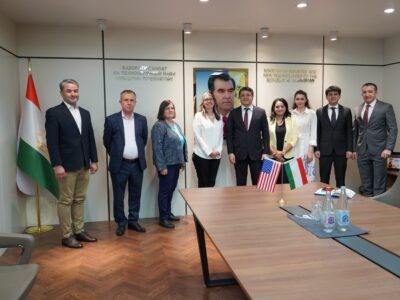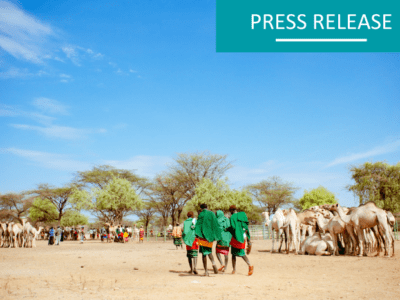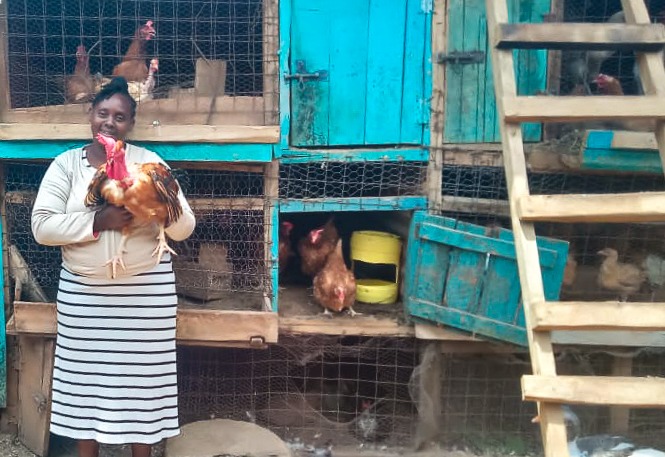
In the heart of Mwangaza Village in Isiolo County, Celina Kathura relishes the sound of clucking poultry in her backyard. Celina is content, as her hard work and resilience are paying off. “For years, I had tried my hand at many different activities, from farming to being a hair saloonist, but none has paid off like poultry rearing,” Celina said.
These challenges led Celina to focus more on rearing poultry using the little knowledge she had. Even then, her challenges continued. “Many times, a whole flock would die, and I would never understand what caused this,” she said. “The feed I would give them never got them to a decent weight that would enable me to fetch a good price at the market.”
Building Skills to Take on the Market
Celina started keeping chicken in 2014 as a side project while she focused on farming. “Here in Isiolo, farming is quite tough,” she said. “The area faces long periods of drought and dry spells that affect crop output. When I was able to lease a farm near a water source and my crops had matured, people would come and steal them. This made it nearly impossible to break even.”
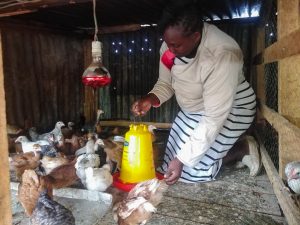
In 2017, Celina enrolled in poultry rearing training through the USAID-funded Feed the Future Kenya Livestock Market Systems Activity. At the training, she learned the importance of nutritious feed, administering medicine, and providing proper housing. She also learned marketing techniques and bookkeeping, which enabled her to keep track of her expenses and profits. Immediately after each training, Celina would implement the lessons she learned and see tangible improvements.
“The first thing I did was to change the breed of poultry I was rearing and opted for an improved local breed. This is because they are more resistant to disease and quite hardy for the environment here. Secondly, I redid the chicken coup and started giving the chickens proper feed, and soon I saw the flock growing steadily and healthy and so did my profits.
— CELINA KATHURA, A POULTRY FARMER IN MWANGAZA, ISIOLO COUNTY
New Equipment, New Ways to Earn
As her business grew, Celina became an example in the community and started sharing her knowledge with those who asked about her success. Celina later acquired an incubator, which took her from rearing chicken to also running a hatchery. The new equipment allowed her to increase her revenue streams, as she was then able to sell chicks to other poultry rearers.
Before the support of the Activity, Celina sold a day-old chick for Ksh. 50 (US$0.50); now she has doubled her price to Ksh. 100 (US$1). Similarly, her prices for a full-grown chicken and cockerel increased from Ksh. 500 (US$5) to Ksh. 800 (US$8) for chickens and Ksh. 1500 (US$15) cockerels after changing to the improved local breed. Currently, Celina’s flock is at 800 birds.
The WhatsApp Connection During Pandemic Lockdowns
In March 2020, the COVID-19 pandemic led to a lockdown and, as a result, several job losses. “Due to the pandemic, fewer people would buy chicken, as they considered it expensive,” Celina said. “Also, due to the restriction of meeting in groups, I couldn’t train as I used to or get access to my egg suppliers for my hatchery.” These challenges led Celina to think outside the box and apply the marketing skills she learned. She turned to the popular messaging application WhatsApp to reach members of the community.
“Since I know many people were home and had been restricted in terms of what they could do, I reached out to them via WhatsApp and presented the idea of poultry rearing to them as an avenue to earn a livelihood. As a result of the wide business network and community involvement I had been engaged in, people were able to trust me and became interested in poultry rearing.”
— Celina Kathura, a poultry farmer in Mwangaza, Isiolo County
Hiring Employees and Reaching New Heights
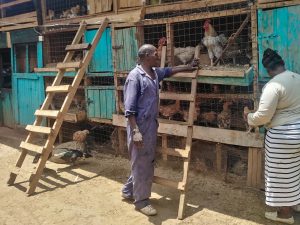
On average, Celina sold a minimum of 200 day-old chicks and 50 cockerels per month. By the end of 2020, she had sold more than 500 cockerels and 1,000 chickens. She has even hired two employees to help her grow her business. Now, she’s looking into further diversifying her income by pursuing hydroponics and fish rearing. Through hydroponics, in which plants may grow without a solid material, such as soil, Celina hopes to generate feed for her chickens to cut down on the costs of purchasing it.
Poultry rearing and the support of the Activity has empowered Celina to pay for her children’s school fees and cover their basic needs. Her chickens have also ensured that her family has nutritious food thanks to the improved local chicken breed. The Activity has trained 539 participants like Celina in Isiolo County in poultry rearing, helping them improve their businesses and diversify their incomes.
About the Activity
The Feed the Future Kenya Livestock Market Systems Activity is a USAID-funded program implemented by ACDI/VOCA, in coordination with partners Mercy Corps, Smart Regional Consultants, and the BOMA Project. The Expanding Economic Opportunities Award facilitates the pull of a more competitive livestock value chain for pastoralists positioned to move up in the sector and more viable, diversified livelihood opportunities for those moving out. It also facilitates an improved enabling environment for inclusive economic growth. The Activity facilitates the poultry rearing training alongside the Isiolo County Livestock Department and Kenchic Limited, a reputable supplier of day-old chicks in the region. The Activity has also supported poultry value chain actors in creating a WhatsApp group for sharing information, making market linkages, and providing extension advice to poultry rearing trainees in Isiolo County.
Learn more about our work in Kenya.


